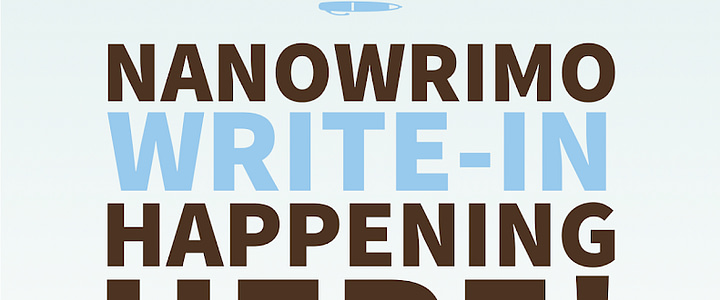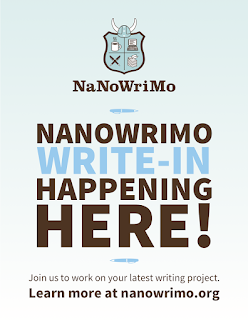
By Beth Green
“Um, why?”
That’s the question I hear most frequently about NaNoWriMo, the month-long challenge to write a novel in a month.
The implication is: Why try to write a whole novel in a month? Aren’t novels, you know, hard?
Blog posts about writing: journalism, NaNoWriMo, creative writing, events for writers, writers at Locus, etc.


By Beth Green
“Um, why?”
That’s the question I hear most frequently about NaNoWriMo, the month-long challenge to write a novel in a month.
The implication is: Why try to write a whole novel in a month? Aren’t novels, you know, hard?

by Beth Green
Today is Halloween, so it’s an appropriate day to ask: What are you afraid of? What specific dread creeps up on you in the dark, when you’re alone?
Many Locus members, I suspect, share one of my fears: The fear of leaving a dream unrealized.
That one project you’ve always wanted to dive into; a pool of potential that only you recognize. Whether that’s a side business you know would be a hit, a spec project that could have real damn legs if only you could take the time to tinker with it, or a creative oeuvre no one is paying for (yet) but you just know deserves to be made real.
A few months ago, Locus Workspace owner Will Bennis sent out a survey asking us about these types of projects. As he called them, “the ones that stay in your mind for years.” Exactly half of the respondents confessed that they had nurtured a project idea for years that they had not yet managed to complete.
It is for this half of the population that National Novel Writing Month (NaNoWriMo) was created. And is this group within Locus Workspace that I would like to invite to the NaNoWriMo Write-Ins that I’ll be hosting on November 4th and 25th in the big conference room. (OK, I lied. All Locus members are invited!)
In case you’re not familiar with NaNoWriMo, a quick explanation: It’s a 30-day event, held in November, in which participants challenge themselves to write the first, hilariously messy draft of a 50,000-word novel. In other words, it’s an opportunity and a blueprint for setting aside time to get one of these big projects out of your head and into the real world.
 For most NaNoWriMo participants, this is a novel, but NaNoRebels may choose to write a series of poems, or essays, or work on a thesis, or storyboard an indie film, or whatever their beautiful, messy minds come up with. In the past 15 years, I’ve personally used NaNoWriMo for momentum to edit existing drafts and do a series of travel memoir essays in addition to novel first drafts.
For most NaNoWriMo participants, this is a novel, but NaNoRebels may choose to write a series of poems, or essays, or work on a thesis, or storyboard an indie film, or whatever their beautiful, messy minds come up with. In the past 15 years, I’ve personally used NaNoWriMo for momentum to edit existing drafts and do a series of travel memoir essays in addition to novel first drafts.
Now do every one of the projects that the estimated 400,000 participants (last year’s numbers) take on turn into a masterpiece? Maybe not. But many do. NaNoWriMo projects that ended up as published novels include Water for Elephants by Sara Gruen (later a movie), The Night Circus by Erin Morgenstern, and Wool by Hugh Howey.
Much like you might join the gym to help you get ready to run a marathon, or take salsa lessons to make sure that you don’t embarrass yourself at your cousin’s wedding next year, or any other kind of small incremental goal that leads up to something more significant, NaNoWriMo encourages you to think of novel writing as something that you practice a little bit each day to work towards one giant goal.
And that’s a takeaway for all of us.
 Though the NaNoWriMo founders maintained that everyone could write a novel with just the scraps of free time that we have when waiting for the tram, for rice to boil, for the conference call to be over, most of us find it helpful during the month to set aside longer chunks of time to write.
Though the NaNoWriMo founders maintained that everyone could write a novel with just the scraps of free time that we have when waiting for the tram, for rice to boil, for the conference call to be over, most of us find it helpful during the month to set aside longer chunks of time to write.
At the write-ins on Nov. 4 and 25, we’ll have a quiet, welcoming space (and coffee and donuts! And official NaNoWriMo swag!) for anyone who wants to come and work on their writing project. Often, we use Pomodoro sessions to help focus, and sometimes we set group goals or talk over plot problems. (For more info, check out my blog post from last year’s write-ins)
You are welcome to come to our write-ins, even if you’re not participating in the full NaNoWriMo event. The more, the merrier!
Happy writing!
I trained as a print journalist. I worked at a newspaper before I moved abroad. I actually taught English as a Second Language for about ten years. Teaching, however, takes a lot of energy. I started getting burned out and saw that I wasn’t benefiting my students. Then I decided to take the skills from journalism and teaching and channel them into communications.
Welcoming.
On Writing and National Novel Writing Month
 |
| You don’t have to write alone! Come to the NaNoWriMo write-ins on Nov. 12 and 19! byPhoto by StockSnap via Pixabay w/ CCO license |
By Beth Green
The first time I experienced the spirit of coworking was about 14 years ago, right here in Prague. Someone I knew had roped me into this crazy challenge—we were setting out to each finish a novel in a month by writing 1,667 words a day.
 |
| Locus NaNoWriMo Write-in 2016 Photos by Beth Green |
The goal of the Write-ins is to simply write. Show up, put your fingers on the keyboard or your pen on the paper and let your creativity do the rest. At the beginning of the meeting you can state goals for the session, if that helps you. I’ll also bring donuts and NaNoWriMo stickers for the people who get there early, so there’s also that. 😎
Check it out! I got some writer goodies to pass out at our Write Ins next month! #nanoprep #NaNoWriMo17 #amwriting pic.twitter.com/q3TSNS6Oar— Beth Green (@Bethverde) October 26, 2017
We’re excited to be able to share her blog post here…


 while men wide and shallow ones.) I’ve added several women to my network from Locus, and started an informal dinner group to encourage young professional women to support each other, over a glass of wine.
while men wide and shallow ones.) I’ve added several women to my network from Locus, and started an informal dinner group to encourage young professional women to support each other, over a glass of wine.
 Once I’d had that moment of realization, that my co-working space was my community, I started to look around for other ways to participate. Engaged in the social media connection and found easy, fun ways to stay involved. I am looking forward to the Christmas Party catered by Ethnocatering, a social enterprise of migrant women that serves authentic food from Georgia, Afghanistan, Belarus, Iran and Armenian. You can’t find this deliciousness in restaurants. I know, I said it, that bad M word. Well, I must own it because here in Prague, I’m a migrant. A tax paying, law abiding expat seeking shelter and new beginnings.
Once I’d had that moment of realization, that my co-working space was my community, I started to look around for other ways to participate. Engaged in the social media connection and found easy, fun ways to stay involved. I am looking forward to the Christmas Party catered by Ethnocatering, a social enterprise of migrant women that serves authentic food from Georgia, Afghanistan, Belarus, Iran and Armenian. You can’t find this deliciousness in restaurants. I know, I said it, that bad M word. Well, I must own it because here in Prague, I’m a migrant. A tax paying, law abiding expat seeking shelter and new beginnings.